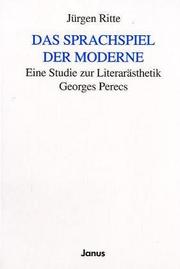| Listing 1 - 10 of 275 | << page >> |
Sort by
|

ISBN: 9783922977414 3922977413 Year: 1992 Publisher: Köln: Janus,
Abstract | Keywords | Export | Availability | Bookmark
 Loading...
Loading...Choose an application
- Reference Manager
- EndNote
- RefWorks (Direct export to RefWorks)

ISBN: 1932416315 9781932416312 Year: 2005 Publisher: [San Francisco : McSweeney's Quarterly Concern,
Abstract | Keywords | Export | Availability | Bookmark
 Loading...
Loading...Choose an application
- Reference Manager
- EndNote
- RefWorks (Direct export to RefWorks)
Book
ISBN: 3110577151 Year: 2018 Publisher: Berlin ; Boston : De Gruyter,
Abstract | Keywords | Export | Availability | Bookmark
 Loading...
Loading...Choose an application
- Reference Manager
- EndNote
- RefWorks (Direct export to RefWorks)
Den Begriff des Tier(reichs) aufnehmend, entwerfen zwölf literarische Texte Ballhausens eine Zoologie des Imaginären. Auf der Basis des vierzehnteiligen mathematischen Denkspiels Stomachion entwickeln die digitalen Zeichnungen Peytchinskas ein Netz, ein sich faltend durch den Buchraum bewegendes theoretisches Tier (Origamion). Seine Linien, die gleichzeitig als Grenze und als Erweiterung von Sprache zu verstehen sind, verschränken sich in ihrer Bewegung mit dem Text. Literatur und Zeichnung treten in Dialog, ein Atlas der Sprachkunst manifestiert sich in Form einer neuen Ordnung. So wird FAUNA als ein zu öffnender Denkraum erfahrbar, ohne dass die Lesbarkeit dieser künstlerischen Unternehmung beeinträchtigt wird – Zeichnungen und Texte treffen sich als Akteure auf der Bühne des Buchraums. Referencing the animal kingdom, Ballhausen’s twelve literary texts create an imaginary zoological scenario. Based on Stomachion, the 14-part mathematical mind game, Peytchinska’s digital drawings develop a network – a theoretical animal (Origamion) that moves through the book space with the folding action. Its lines, which should be understood as boundary as well as an extension of language, interweave with the text as they move through the book. Literature and drawing enter into a dialog – an atlas of language art manifests in the form of a new order. In this way, FAUNA can be experienced as a thinking space that is to be opened – without however interfering with the readability of this artistic enterprise; drawings and text meet as actors on the stage of the book space.
Book
ISBN: 3416018621 Year: 1985 Publisher: Bonn Bouvier
Abstract | Keywords | Export | Availability | Bookmark
 Loading...
Loading...Choose an application
- Reference Manager
- EndNote
- RefWorks (Direct export to RefWorks)
Book
ISBN: 2907702017 2858931275 9782858931279 9782907702010 Year: 1990 Publisher: [Paris] : Ent'revues : Jean Michel Place,
Abstract | Keywords | Export | Availability | Bookmark
 Loading...
Loading...Choose an application
- Reference Manager
- EndNote
- RefWorks (Direct export to RefWorks)
Book
Abstract | Keywords | Export | Availability | Bookmark
 Loading...
Loading...Choose an application
- Reference Manager
- EndNote
- RefWorks (Direct export to RefWorks)
Book
ISBN: 5280018325 Year: 1991 Publisher: Leningrad : Chudožestvennaja literatura,
Abstract | Keywords | Export | Availability | Bookmark
 Loading...
Loading...Choose an application
- Reference Manager
- EndNote
- RefWorks (Direct export to RefWorks)
Book
Year: 2010 Publisher: Sarajevo : Slavistički komitet BiH,
Abstract | Keywords | Export | Availability | Bookmark
 Loading...
Loading...Choose an application
- Reference Manager
- EndNote
- RefWorks (Direct export to RefWorks)
This book, in a way, engages in a polemic with texts which interpret avantgarde exclusively in the context of a destructive and negatory attitude toward tradition as such. It aims to present Dizdar's best collection of poems as an exceptional, unique example of an avant-garde text, and to discuss Stone Sleeper from a somewhat different angle.As is known, the main task the avant-garde movement took on was to create a kind of art which would correspond with the basic principle of life - the principle of perpetual renewal; the stress avant-garde laid on the written word was informed by a deeply-held conviction that poetry is able to revive lost or forgotten worlds, but also to remember and in this way save worlds from disappearance and death. Stone Sleeper is a magical, lyrical inscenation which fulfils this task by placing trust in, and paying particular attention to the written word. Dizdar's focus on the word, as one of the fundamental principles of avant-garde, is motivated, of course, by the subject matter of Stone Sleeper,its inspirational basis. The stećak1 is Dizdar's fundamental artistic reference.In an attempt aesthetically to express the weight, hardness and substantiality of the stone and the facture of the sepulchral word and letter, Dizdar revives the petrified word of the Bosnian epitaph, masterfully demonstrating how creative potential of poetic language, from which an entire forgotten world emerges, is awakened.Avant-garde is also characterised by the principle of innovation. At first glance, and first glance only, this principle does not fit into Dizdar's aesthetics.For, as has been said in one of the manifestos of the Russian literary avant-garde, "(...) New subjects and objects of creation do not determine its true novelty, and a new light cast on an old world may bring about a most wondrous play." Stone Sleeper is one such spiritual delving into the silent primordium of Dizdar's native land and culture. Instead of progressive movement toward future, amid the roar of time, in Dizdar, just as in Russian acmeists and some futurists (Khlebnikov), we find innovation asa recreation of direct, vivid experience of the world through primordial meanings of the words whose sense had either been petrified by prolonged everyday use and is thus in need of de-petrification, or completely forgotten and needs to be resurrected. Such words in Dizdar's poetry are invested with power, or, as K. Prohić says, with "naturalness of elementary truths and unmediated experience.".
Book
ISBN: 0776621416 9780776621418 9780776621401 0776621408 9780776621425 0776621424 9780776621395 0776621394 Year: 2014 Publisher: Ottawa University of Ottawa Press
Abstract | Keywords | Export | Availability | Bookmark
 Loading...
Loading...Choose an application
- Reference Manager
- EndNote
- RefWorks (Direct export to RefWorks)
The first multi-disciplinary collection of essays to focus exclusively on early Canadian literature with the aim of reassessing the field and proposing new approaches.
Book
ISBN: 9788871199382 8871199383 Year: 1996 Publisher: Roma: Bulzoni,
Abstract | Keywords | Export | Availability | Bookmark
 Loading...
Loading...Choose an application
- Reference Manager
- EndNote
- RefWorks (Direct export to RefWorks)
Literature, Experimental --- Literature, Experimental --- Avant-garde (Aesthetics) --- Aesthetics, Modern
| Listing 1 - 10 of 275 | << page >> |
Sort by
|

 Search
Search Feedback
Feedback About UniCat
About UniCat  Help
Help News
News